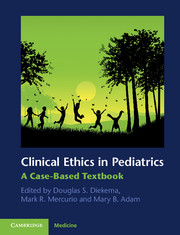Book contents
- Frontmatter
- Contents
- Contributors
- Preface
- Section 1 Core issues in clinical pediatric ethics
- Pediatric decision-making: informed consent, parental permission, and child assent
- 2 Pediatric decision-making: adolescent patients
- 3 Parental refusals of recommended medical interventions
- 4 Adolescent confidentiality
- 5 Refusals of treatment in adolescents and young adults
- 6 Family beliefs and the medical care of children
- 7 Fidelity and truthfulness in the pediatric setting: withholding information from children and adolescents
- 8 Fidelity and truthfulness: disclosure of errors
- 9 Requests for “non-therapeutic” interventions in children: male circumcision
- Section 2 Ethical issues at the beginning of life: perinatology and neonatology
- Section 3 When a child dies: ethical issues at the end of life
- Section 4 Ethical issues posed by advances in medical technology and science
- Section 5 Children, public health, and justice
- Section 6 Special topics in pediatric ethics
- Index
- References
3 - Parental refusals of recommended medical interventions
from Section 1 - Core issues in clinical pediatric ethics
Published online by Cambridge University Press: 07 October 2011
- Frontmatter
- Contents
- Contributors
- Preface
- Section 1 Core issues in clinical pediatric ethics
- Pediatric decision-making: informed consent, parental permission, and child assent
- 2 Pediatric decision-making: adolescent patients
- 3 Parental refusals of recommended medical interventions
- 4 Adolescent confidentiality
- 5 Refusals of treatment in adolescents and young adults
- 6 Family beliefs and the medical care of children
- 7 Fidelity and truthfulness in the pediatric setting: withholding information from children and adolescents
- 8 Fidelity and truthfulness: disclosure of errors
- 9 Requests for “non-therapeutic” interventions in children: male circumcision
- Section 2 Ethical issues at the beginning of life: perinatology and neonatology
- Section 3 When a child dies: ethical issues at the end of life
- Section 4 Ethical issues posed by advances in medical technology and science
- Section 5 Children, public health, and justice
- Section 6 Special topics in pediatric ethics
- Index
- References
Summary
Case narrative
A 3-year-old child is brought to the emergency department by his parents who have concerns about a head injury. The day before, the child had been playing on the monkey bars when he fell about 4 feet and hit his head on the ground. He did not lose consciousness, and after about 15 minutes of crying, appeared to be fine. Today, however, he has been complaining that his head hurts and has been vomiting. He has vomited three times since arriving in the emergency department and continues to complain of a headache. The emergency department physician tells the parents that he is concerned about the possibility of intracranial bleeding and feels a CT scan of the head is essential to make a timely diagnosis and intervene if necessary. The parents are convinced that previous X-rays gave their son some learning problems, and refuse to consent to the CT scan.
Introduction
Responding to a parent who has refused a recommended diagnostic study or treatment modality presents a difficult challenge for clinicians. Clinicians must balance their assessment of the child’s well-being with respect for the parent’s wishes and legal rights. What are the limitations on a parent’s right to refuse diagnostic testing or treatment for a child? How does a clinician resolve conflicts between the parent’s values and his or her own as a medical professional? At what point should a clinician consider interfering with a parental decision to ignore the clinician’s recommended course of diagnosis and/or treatment? What are the steps a clinician must take in order to justify involving state agencies to compel testing or treatment over parental objections?
- Type
- Chapter
- Information
- Clinical Ethics in PediatricsA Case-Based Textbook, pp. 14 - 17Publisher: Cambridge University PressPrint publication year: 2011
References
- 6
- Cited by



